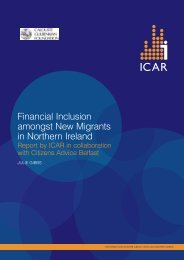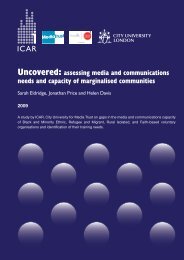The Somali community in the UK: What we know and how we ... - ICAR
The Somali community in the UK: What we know and how we ... - ICAR
The Somali community in the UK: What we know and how we ... - ICAR
You also want an ePaper? Increase the reach of your titles
YUMPU automatically turns print PDFs into web optimized ePapers that Google loves.
of accurate numerical data. This is not true of all<br />
reports. Many <strong>in</strong>clude quantitative data based on<br />
<strong>the</strong>ir samples. But <strong>in</strong> <strong>the</strong> absence of a firm sampl<strong>in</strong>g<br />
frame, statistically sound generalisations of a<br />
particular category cannot be made.<br />
In some contexts, such as a def<strong>in</strong>ed school<br />
population, r<strong>and</strong>om sampl<strong>in</strong>g is possible. But <strong>in</strong><br />
o<strong>the</strong>rs, such as a locality, means of sampl<strong>in</strong>g have<br />
to be chosen which cannot produce a statistically<br />
sound study. <strong>The</strong> most common is <strong>the</strong> method<br />
which is usually employed <strong>in</strong> qualitative work, but <strong>in</strong><br />
<strong>Somali</strong> research is also used to select samples. This<br />
is <strong>the</strong> ‘snowball’ or network technique, whereby<br />
contact is <strong>in</strong>itially made with ‘gatekeepers’, who<br />
provide access <strong>in</strong>to <strong>the</strong> chosen <strong>community</strong>. <strong>The</strong>se<br />
may be <strong>in</strong>dividuals who <strong>in</strong>troduce <strong>the</strong> researcher<br />
to friends, family, or co-members of groups.<br />
O<strong>the</strong>r common start<strong>in</strong>g po<strong>in</strong>ts are RCOs, <strong>Somali</strong><br />
associations, or o<strong>the</strong>r voluntary or statutory<br />
bodies who work with <strong>Somali</strong>s.<br />
Whilst often <strong>the</strong> only avenue, <strong>and</strong> one which<br />
is effective <strong>in</strong> communicat<strong>in</strong>g trust, snowball<br />
sampl<strong>in</strong>g through gatekeepers has its drawbacks.<br />
If contacts are made though one <strong>in</strong>dividual, <strong>the</strong><br />
network may be characterised by particular traits<br />
or circumstances - <strong>the</strong> lifestyles <strong>and</strong> networks of<br />
<strong>the</strong>se <strong>in</strong>itial contacts are likely to determ<strong>in</strong>e <strong>the</strong><br />
demographics <strong>and</strong> socio-political orientation of<br />
<strong>the</strong> referral cha<strong>in</strong> that follows. For Muslims <strong>in</strong> <strong>the</strong><br />
diaspora, Berns McGown contacted her London<br />
sample though two <strong>community</strong> organisations <strong>and</strong> a<br />
mosque (1999: 10). Could this have <strong>in</strong>fluenced her<br />
f<strong>in</strong>d<strong>in</strong>gs on <strong>the</strong> resurgence of <strong>in</strong>terest <strong>in</strong> religion<br />
amongst her <strong>in</strong>formants? Researchers often stress<br />
that <strong>the</strong>y have used multiple gatekeepers to enable<br />
diversity, but access through organisations to its<br />
members leaves <strong>the</strong> problem of ‘non-jo<strong>in</strong>ers’, those<br />
rema<strong>in</strong><strong>in</strong>g outside <strong>the</strong> group who might represent a<br />
different section of <strong>the</strong> <strong>community</strong>.<br />
In order to keep a balance of gender, age,<br />
occupation, <strong>and</strong> o<strong>the</strong>r relevant variables,<br />
researchers may <strong>in</strong>troduce quota sampl<strong>in</strong>g,<br />
select<strong>in</strong>g respondents who fit <strong>in</strong>to certa<strong>in</strong> prespecified<br />
categories <strong>in</strong> order to represent a survey<br />
population. Whilst this is a step towards elim<strong>in</strong>at<strong>in</strong>g<br />
bias, <strong>in</strong> <strong>the</strong> absence of a national sampl<strong>in</strong>g base it<br />
is impossible to make generalisations based on<br />
probability about <strong>the</strong> <strong>Somali</strong> population <strong>in</strong> <strong>the</strong> <strong>UK</strong>.<br />
Ano<strong>the</strong>r form of quota sampl<strong>in</strong>g is to l<strong>in</strong>k <strong>the</strong> study<br />
to a particular group or topic – youth,<br />
women, health, education. As <strong>we</strong> have seen, many<br />
<strong>Somali</strong> reports are s<strong>in</strong>gle-topic. But some of <strong>the</strong><br />
richest material <strong>we</strong> have of this k<strong>in</strong>d dispenses<br />
with <strong>the</strong> attempt to f<strong>in</strong>d a statistical base <strong>and</strong><br />
relies on qualitative material. A recent example<br />
is Lucy Hannan’s outst<strong>and</strong><strong>in</strong>g report A gap <strong>in</strong><br />
<strong>the</strong>ir hearts (2003) on separated <strong>Somali</strong> children<br />
arriv<strong>in</strong>g <strong>in</strong> <strong>the</strong> <strong>UK</strong> without <strong>the</strong>ir parents. <strong>The</strong><br />
depth of both background research <strong>and</strong> <strong>in</strong>terviews<br />
with young people, <strong>in</strong>clud<strong>in</strong>g extensive personal<br />
accounts, <strong>in</strong>spires confidence that her f<strong>in</strong>d<strong>in</strong>gs are<br />
representative, even if this cannot be statistically<br />
proven. <strong>The</strong> impossibility of obta<strong>in</strong><strong>in</strong>g a r<strong>and</strong>om<br />
sample is irrelevant. An advantage of reports of this<br />
quality is that <strong>the</strong>y are picked up by <strong>the</strong> press, <strong>and</strong><br />
so come <strong>in</strong>to <strong>the</strong> public doma<strong>in</strong>.<br />
Although Hannan makes no methodological<br />
comment, studies such as this clearly rely on<br />
<strong>in</strong>tensive <strong>in</strong>-depth <strong>in</strong>terview<strong>in</strong>g. Interview<strong>in</strong>g<br />
techniques recorded <strong>in</strong> reports range from <strong>the</strong><br />
adm<strong>in</strong>istration of fixed pre-coded questionnaires,<br />
written or recorded, through various comb<strong>in</strong>ations<br />
of open-ended question<strong>in</strong>g, <strong>and</strong> structured, semistructured,<br />
<strong>and</strong> unstructured <strong>in</strong>terviews. <strong>The</strong> form<br />
depends on <strong>the</strong> k<strong>in</strong>d of <strong>in</strong>formation required, but<br />
because of <strong>the</strong> difficulty of select<strong>in</strong>g samples <strong>and</strong><br />
ga<strong>in</strong><strong>in</strong>g adequate access to <strong>in</strong>formants, <strong>the</strong> numbers<br />
<strong>in</strong>tervie<strong>we</strong>d <strong>in</strong> many studies are extremely small.<br />
<strong>The</strong>re is seldom enough recognition that formal<br />
structured <strong>in</strong>terviews are <strong>the</strong>mselves problematic,<br />
whe<strong>the</strong>r try<strong>in</strong>g to establish events or ask<strong>in</strong>g for<br />
an op<strong>in</strong>ion. Respondents rarely give accurate<br />
<strong>in</strong>formation to an un<strong>know</strong>n <strong>in</strong>vestigator, especially<br />
on topics seen as personal. <strong>The</strong>re is much to be<br />
said for long-term qualitative research <strong>and</strong> casehistory<br />
evidence. Even though <strong>the</strong> f<strong>in</strong>d<strong>in</strong>gs cannot<br />
be strictly quantified, <strong>the</strong>y <strong>in</strong>troduce agency, open<br />
a w<strong>in</strong>dow on <strong>the</strong> process of social life, illum<strong>in</strong>ate<br />
generalisations, <strong>and</strong> counter <strong>the</strong> essentialisation of<br />
groups <strong>and</strong> communities.<br />
<strong>The</strong> <strong>Somali</strong> <strong>community</strong> <strong>in</strong> <strong>the</strong> <strong>UK</strong><br />
17

















